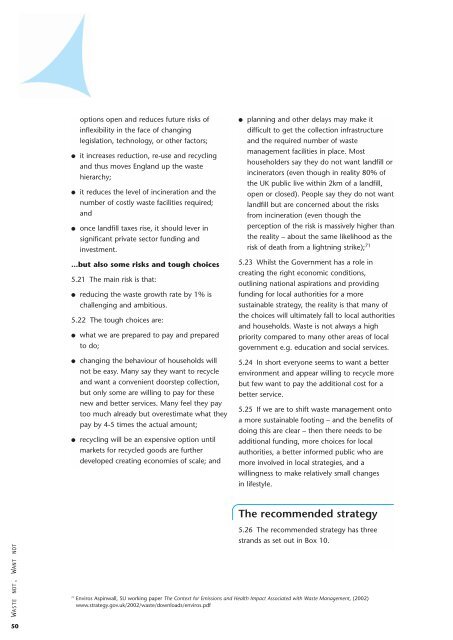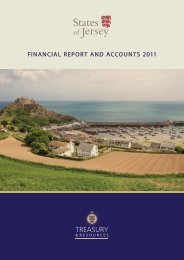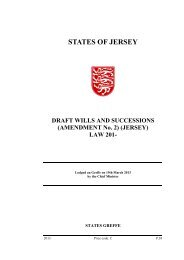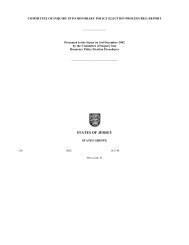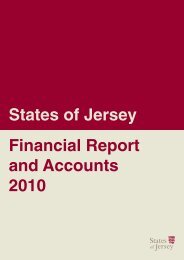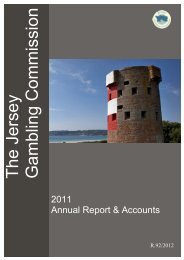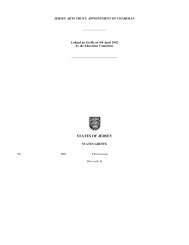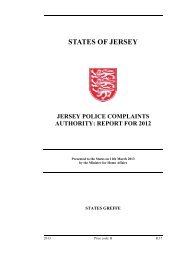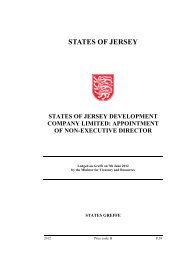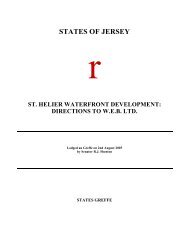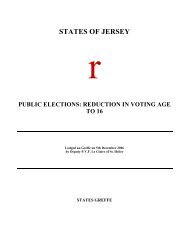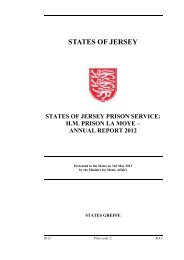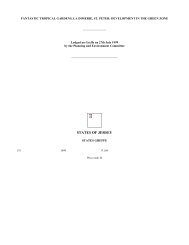Waste not want not - States Assembly
Waste not want not - States Assembly
Waste not want not - States Assembly
You also want an ePaper? Increase the reach of your titles
YUMPU automatically turns print PDFs into web optimized ePapers that Google loves.
●<br />
●<br />
●<br />
options open and reduces future risks of<br />
inflexibility in the face of changing<br />
legislation, technology, or other factors;<br />
it increases reduction, re-use and recycling<br />
and thus moves England up the waste<br />
hierarchy;<br />
it reduces the level of incineration and the<br />
number of costly waste facilities required;<br />
and<br />
once landfill taxes rise, it should lever in<br />
significant private sector funding and<br />
investment.<br />
...but also some risks and tough choices<br />
5.21 The main risk is that:<br />
●<br />
reducing the waste growth rate by 1% is<br />
challenging and ambitious.<br />
5.22 The tough choices are:<br />
●<br />
●<br />
●<br />
what we are prepared to pay and prepared<br />
to do;<br />
changing the behaviour of households will<br />
<strong>not</strong> be easy. Many say they <strong>want</strong> to recycle<br />
and <strong>want</strong> a convenient doorstep collection,<br />
but only some are willing to pay for these<br />
new and better services. Many feel they pay<br />
too much already but overestimate what they<br />
pay by 4-5 times the actual amount;<br />
recycling will be an expensive option until<br />
markets for recycled goods are further<br />
developed creating economies of scale; and<br />
●<br />
planning and other delays may make it<br />
difficult to get the collection infrastructure<br />
and the required number of waste<br />
management facilities in place. Most<br />
householders say they do <strong>not</strong> <strong>want</strong> landfill or<br />
incinerators (even though in reality 80% of<br />
the UK public live within 2km of a landfill,<br />
open or closed). People say they do <strong>not</strong> <strong>want</strong><br />
landfill but are concerned about the risks<br />
from incineration (even though the<br />
perception of the risk is massively higher than<br />
the reality – about the same likelihood as the<br />
risk of death from a lightning strike); 71<br />
5.23 Whilst the Government has a role in<br />
creating the right economic conditions,<br />
outlining national aspirations and providing<br />
funding for local authorities for a more<br />
sustainable strategy, the reality is that many of<br />
the choices will ultimately fall to local authorities<br />
and households. <strong>Waste</strong> is <strong>not</strong> always a high<br />
priority compared to many other areas of local<br />
government e.g. education and social services.<br />
5.24 In short everyone seems to <strong>want</strong> a better<br />
environment and appear willing to recycle more<br />
but few <strong>want</strong> to pay the additional cost for a<br />
better service.<br />
5.25 If we are to shift waste management onto<br />
a more sustainable footing – and the benefits of<br />
doing this are clear – then there needs to be<br />
additional funding, more choices for local<br />
authorities, a better informed public who are<br />
more involved in local strategies, and a<br />
willingness to make relatively small changes<br />
in lifestyle.<br />
The recommended strategy<br />
WASTE NOT, WANT NOT<br />
5.26 The recommended strategy has three<br />
strands as set out in Box 10.<br />
71<br />
Enviros Aspinwall, SU working paper The Context for Emissions and Health Impact Associated with <strong>Waste</strong> Management, (2002)<br />
www.strategy.gov.uk/2002/waste/downloads/enviros.pdf<br />
50


